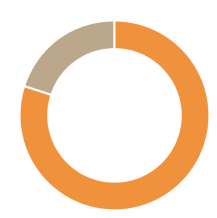How to thrive at work if you're suffering with poor mental health
This OCD Awareness Month, we spoke to Colin Minto, Global Early Careers Talent Attraction Lead at HSBC and renowned spokesperson for people with OCD and other mental differences. We asked him about approaches to mental health conditions in the workplace. Click here to go straight to our employer insights, or read on for our employee tips.
Juggling work and your mental wellbeing can be difficult at the best of times, and is only exacerbated if you are suffering from mental ill health. Although the responsibility for destigmatising mental health and supporting people is shared between employers, medical professionals, government, and the wider community, there are still things you can do to own your mental health and help yourself thrive.
Take personal responsibility
"One of the first things you do when you identify you have a mental health condition, is you learn that there's certain things that you shouldn't be doing that are going to make the pressure cooker kick in. Reduce sugar, don't take caffeine, try and sleep as much as you can, do relaxation, cut out the alcohol, do lots of exercise… If you’re physically fit, that helps you to become mentally fit. You need to take a personal responsibility to do the right things, to get yourself in a physical or mental position to be able to combat this.
"If you find yourself stuck in a loop of harmful thoughts and behaviours and don't try to remedy that and get diagnosed, then you’re gonna go in a downward spiral. If you are experiencing any signs of mental illness that are affecting your day-to-day life, absolutely go to the medical profession and talk it through. Thankfully, nowadays they are much more aware of different mental health conditions and all the different symptoms and can diagnose quite quickly."
Speak openly
"Be open with your employer, and don’t be afraid to talk about the downsides. When I decided to try medication again, I wasn't sleeping well. I was really struggling, I was yawning all day. That's why I spoke to my boss and I said, 'Look, I'm going to be honest with you, you know my [mental health] background, I've gone back on the meds. If I'm sitting here and I'm just away with the fairies or I'm yawning my head off, it will pass, I hope'. The response for me was phenomenal. It was, 'Absolutely, no problem. What can we do to help you?' The perfect response from an absolute legend that I worked for."
GoodShape top tip: If you don't feel comfortable speaking with your manager, speak to someone from your People or HR team.
Discover your superpowers
"Living with OCD, I've realised I’ve got skills, qualities and capabilities as a consequence of it. I can spot a risk a mile off, and I’ve got a solutions brain. When I’ve been solving the most catastrophic concerns in my head, risk workshops or recruitment drives are easy. I can proofread for Britain as well!
"When I do my talks, I talk about the X-Men, a group of men and women that have a gift that might originally be seen as a disadvantage. Someone's bright blue, someone can disappear, someone can mind control, someone can move metal. The X-Men, they go into battle - invariably against the humans, the 'normal folk' - but who always wins? The people that come together, the ones that have the differences make a much bigger difference than everyone that claims to be 'normal'.
"So this is where I think we now need to just say: look, I've got this difference. As a consequence of that, there are some downsides, but what I do like is the fact that I can go into a meeting and I can spot things, solve things; I can be that person that picks up on something that could have been a major commercial risk. It’s all about getting your mental health under control then turning negatives into positives.
"I want us to just get it out there. Let's talk about it. Why not? And if you get judged by someone and you get disadvantaged as a consequence of it, you don't want to know that person. You don't want to work for that organisation. You've saved yourself a major issue of working for them for many, many years and then realising you're just a number.
"Someone once told me: 'If you’re tea, sell yourself as tea, don't try to sell yourself as coffee.'"
To learn more about Colin's awareness work, head his OCD October and OCD unplugged pages.
To learn more about Colin's OCD story and how employers can support their people's mental health, read the full Good Leaders interview here.
“We have been using the GoodShape service since 2007”

Lorem ipsum dolor
sit amet, consectetuer
adipiscing.

Lorem ipsum dolor
sit amet, consectetuer
adipiscing.
Find out how we can help.
Fill out the form below and one of our team will be in touch to arrange a meeting.



